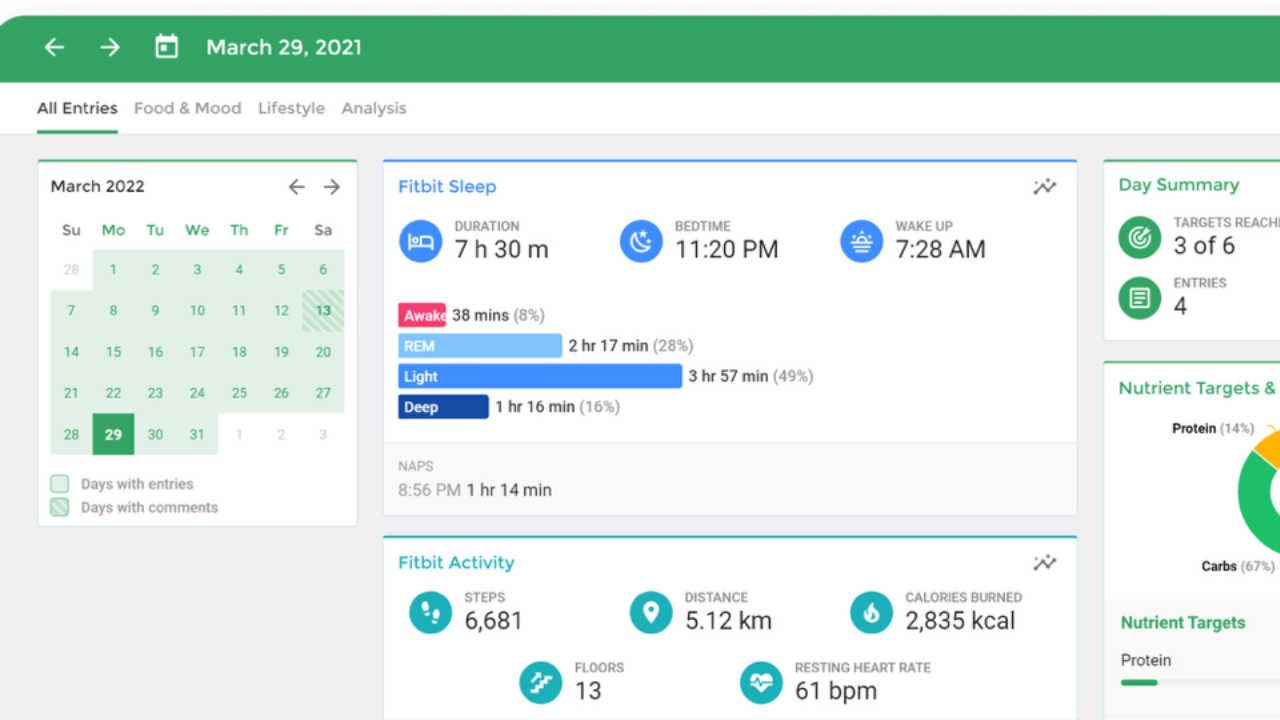Harnessing the Power of a Food & Symptom Journal for Effective IBS Management and Digestive Health
Living with a digestive condition such as Irritable Bowel Syndrome (IBS) or Gastroesophageal Reflux Disease (GERD) can bring about discomfort—digestive issues, bloating, constipation, and more—severely impacting your quality of life.
Today, we'll explore a crucial initial step that could assist in pinpointing triggers for these symptoms and preparing strategies to manage them: the food and gut journal!
What is a Food & Symptom Journal?
A food and gut journal serves as a personalized diary documenting your daily intake and its impact on your well-being. This tool allows you to track everything you consume, including beverages, while noting crucial details about digestive symptoms, mood fluctuations, exercise, rest patterns, and other relevant factors.
This journal can take various forms, depending on your preference. In my program, I have clients log their food, symptoms and lifestyle habits on an online platform (available on a phone app and desktop browser) that makes it easy for us to review trends together over time.
Why Keep a Food and Symptom Journal?
Keeping a journal is integral to creating and implementing a long term plan to help manage conditions like IBS, SIBO and GERD. Let’s get into four key reasons why.
1. We’re Naturally Forgetful
Can you remember what you ate for dinner last Tuesday? How about the number of days your last IBS flare-up lasted? Or the number on the Bristol Stool Chart your bowel movement was two weeks ago after you drank a glass of wine? Probably not, unless you're someone with superhuman memory!
Keeping a detailed record can help us to look back at our actions, habits & symptoms for a holistic picture.
2. Identify Connections & Potential Triggers
By meticulously recording these details, a food and gut journal offers invaluable insights to help both you and your healthcare team find connections with symptoms, bowel regularity, food choices, and lifestyle triggers (sleep, stress/anxiety, activity, hormones).
Many of my clients find that keeping their detailed journal in preparation for our first session leads to a couple “aha” moments.
3. Better Support Your Plan With Your Dietitian & Healthcare Team
When working with a Dietitian, we can review nutritional adequacy, symptom history, lifestyle factors, and more from a detailed journal, and make connections and assess room for improvement to better support your plan.
Keeping a symptom journal can also help you advocate for better treatment, testing and investigation with your doctor if you feel there is more going on and you have not been properly diagnosed.
4. Aid in Creating a Personalized Management Plan For IBS & Digestive Disorders
As noted above, by meticulously recording details, a food and symptom journal offers invaluable insights, aiding both you and your healthcare team in understanding your body's responses and crafting a tailored, long term plan to manage your IBS, GERD and other digestive issues.
What Does a Gut Health Dietitian Look For?
If working together, this is a snapshot of what I would look for in reviewing your food & symptom journal:
Frequency, quantity of gut irritants
FODMAPs in foods
Nutritional adequacy
Types and severity of symptoms such as bloating, distension, abdominal pain, reflux, urgency, nausea, fullness, incomplete emptying
Fibre intake
Serving sizes of FODMAPs
FODMAP load per meal or day
Timing of symptoms
Meal spacing
Fluid intake (types, amounts, timing)
Stress & anxiety
Movement / activity
As you can see, quite a lot! Gathering this data helps me to assess what the problem (s) are, as well as key areas of improvement and change to help find you lasting relief.
How to Keep Your Food & Symptom Journal
Here are some important notes regarding what to write down, and some of my favourite places to do so. These tips will guide you to creating a very useful food & gut journal!
What to Include:
I would recommend including the following details:
Digestive symptoms (bloating, gas, distention, reflux, pain) - scale 1-10 severity
Bowel movements - type on Bristol chart, time of day, satisfactory (yes/no)
Food & drink in detail - type, portion, method prepared, location
Stress/Anxiety – severity on scale of 1-10
Menstrual cycle – 5-7 days before & start of cycle
Sleep – length, quality
Activity – workout type, time, intensity
Where to Keep Track:
As a digestive health Dietitian, I have explored many of the options for food journals and have found that find tracking apps to be the fastest and most functional option for my clients and course members. Tracking apps make it easy to keep your food journal with you no matter where you are, since our phones seem to travel with us these days!
Digital Applications/Programs:
MySymptoms Journal: This app will keep a record of your food, activity, supplements & symptoms and create a report for you after at least one month of tracking!
Cronometer: This app provides an in-depth nutrition breakdown of your food and gives you the option to add in notes regarding any symptoms you’re experiencing.
Practice Better: If we are working together, we will use the detailed journal in my nutrition software for you to keep your food & symptoms journal. My clients LOVE using this app, and it is the best I’ve found for working with clients and assessing both their nutritional intake as well as digestive symptoms and bowel habits.
If you prefer something tech-free, pen and paper is always an option. I have included a handy printout as well as an excel sheet to get you started if this is the case..
Printable option: Printable Food Journal
Downloadable Excel Tracker: Excel spreadsheet food diary
How Long to Keep Your Food & Symptom Journal For:
It is helpful to keep your journal going for a few weeks as you start making changes, such as doing a low-fodmap elimination, increasing fiber and more. Once your digestion has improved and things are feeling great, you can stop journaling and just focus on feeling good long term!
Extra Tips to Make Keeping Your Journal Easier
Here are some tips to help making keeping your journal easier:
Make notes right away – the longer you wait to jot down a symptom or meal, the more likely you’ll forget
If you don’t want to always be on your phone… Keep notes in a paper journal and/or take quick photos of your meals - then enter in your online journal (the above have desktop versions) at end of day
Try a hand portion guide for quick food estimates
Considerations For Eating Disorders & Disordered Eating
Food and symptom journals can be powerful tools for understanding eating habits and associated feelings, yet for individuals navigating eating disorders or disordered eating, using these journals may require additional sensitivity and caution. While journals can offer insight, they must be approached with care to avoid triggering unhealthy behaviors or obsessive tracking.
For those recovering from an eating disorder, guidance from a healthcare professional such as Registered Dietitian or Psychologist is crucial when utilizing a food journal. Emphasizing self-care, balanced nutrition, and emotional well-being should take precedence over strict journaling for individuals in recovery from eating disorders or managing disordered eating patterns.
In my Gut Harmony Method Program, for clients with history of eating disorders or disordered eating, we may simply keep a photo food journal with notes on mood, symptoms and energy, and avoid showing any nutritional analysis (ie. calorie and macronutrient tracking). Of course, this depends on the client and we would discuss which option feels best for them and does not trigger any unwanted thoughts or anxieties around eating.
Personalized Support & Accountability
Now that we’ve laid down the importance of a food & symptom journal, are you ready to start keeping one? To be honest, having accountability when keeping a journal and knowing that someone will be looking at it with you, makes it far more valuable.
In my practice, I have clients keep a food and symptom journal in preparation for our initial assessment, as well as periodically during the program to monitor their progress with our plan. I help clients not only identify their food triggers and tolerance levels with a food and symptom journal, but also work to HEAL their gut and rebalance the gut-microbiome through evidence-based strategies and better habits so that they can tolerate MORE foods long term.
If you’re looking for personalized support and ready to make the most of a food and symptom journal, here are the ways I can help support you:
1-1 Coaching: Gut Harmony Method Program
My flagship 1-1 coaching program to help individuals with IBS, SIBO and persistent gut symptoms to get to the root of their symptoms, increase energy, regulate their bowel habits and digestion, and support long-term digestive harmony.
Gut Harmony Society: IBS Course & Community
A budget friendly, personalized online course with community support to help you break free from IBS and gut problems, complete the low FODMAP process, regulate your bowels, increase energy, and create sustainable long term habits.
Conclusion
In the journey towards managing digestive health conditions, maintaining a food and symptom journal is an empowering tool for individuals seeking to identify triggers, understand habits, and work effectively with their healthcare team.
For personalized guidance and support to uncover food triggers and restore gut health, I offer 1-1 coaching and an online program to help you to find lasting relief from IBS, SIBO and uncomfortable gut symptoms. Together, we can not only track and understand your symptoms but also work towards healing and achieving lasting digestive harmony.
Summary:
Importance of Journaling: A food and symptom journal serves as a pivotal tool in managing digestive health conditions like IBS and GERD, aiding in tracking daily intake, symptoms, and lifestyle factors.
What to Include: Details to include in the journal encompass digestive symptoms, bowel movements, food and drink specifics, stress/anxiety levels, menstrual cycle, sleep, and activity.
Journaling Tools: Various options such as tracking apps like MySymptoms or Cronometer, printable journals are ways to keep your journal. For my clients, I use a user-friendly app called Practice Better.
Considerations: For individuals dealing with eating disorders or disordered eating, using these journals requires caution and guidance from healthcare professionals prioritizing self-care and balanced nutrition over strict tracking.
Personalized Support: A journal is best done with the guidance of a healthcare practitioner like a Registered Dietitian to help you to accurately assess trends and develop an evidence-based, personalized plan to manage conditions like IBS, SIBO and GERD.
Have you found benefit in keeping a food & symptom journal? Let me know below!















